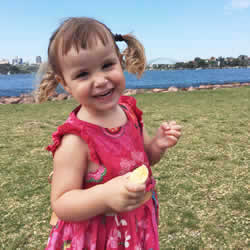Food Protein Induced Enterocolitis Syndrome (FPIES) - Dorotea's Story
 Dorotea was diagnosed with Food Protein Induced Enterocolitis Syndrome (FPIES) at 4 months of age.
Dorotea was diagnosed with Food Protein Induced Enterocolitis Syndrome (FPIES) at 4 months of age.
"To say that having a child with FPIES is stressful is an understatement," Dorotea's mother Amanda writes. "Getting help for these children is very difficult as the condition is rare and even many paediatricians are inexperienced in the management of it. Dorotea's first admission to hospital was after a severe reaction to soy formula. As is often the case, it was misdiagnosed as a viral gastroenteritis.
The main symptom of FPIES is profuse vomiting, which can be accompanied by pallor, floppiness, hypotension and hypothermia. The FPIES reactions may be triggered by a variety of foods, although the most common triggers in Australia are staple foods such as cow’s milk, rice/oats, soy and eggs.
Amanda explains that "the diagnosis of FPIES is just the beginning of what is often an incredibly exhausting few years. Because there is no testing available to ascertain what foods are safe, each new food needs to be trialled separately. We long to see this condition better understood so that families do not have to live with the exhaustion and uncertainty that marks our weeks."
Amanda describes Dorotea's experience: "Many children with FPIES react to only one or maybe two foods. We haven't been quite so lucky. Each new food we have introduced can mean acute vomiting, diarrhea, screaming and thrashing around for days on end, dehydration and lethargy. It is incredibly draining for our family. There have been many times when I haven't slept for 3 or 4 days at a time because Dorotea has been so unwell.
"Most children outgrow their FPIES. As a parent you cling to this hope! Unfortunately the only way to know whether your child has outgrown it is to keep reintroducing foods that have previously caused reactions. I operate on a 6 monthly cycle. To juggle work and family commitments, I introduce the food at midday on Friday so that she is potentially worse over the weekend thus causing least disruption to our family rhythm.
"Dorotea now has complex food aversions. It is impossible to teach her that food is safe when so many of the foods we trial for her make her very unwell. Every day I have to manage her fluid and food intake to ensure that she has enough to sustain her body. She had a period where she was fed by nasogastric tube. Dorotea is a vibrant, determined and happy little girl. We talk to her about the hope she has of food becoming her friend. We also long to see this condition better understood so that families do not have to live with the exhaustion and uncertainty that marks our weeks."
The research team funded by the AIFA grant is led by Dr Sam Mehr, a clinical immunology and allergy specialist at The Children's Hospital at Westmead. This team aims to better understand what genes are switched on in an FPIES reaction to improve diagnosis and treatment . They will be looking at tests to predict whether children are still allergic to the food which gave them the FPIES reaction, and how long it takes infants to outgrow their allergy. "This is important so that children are not uncessarily avoiding an important food for a prolonged period of time", Dr Mehr said.
Thank you Amanda for sharing Dorotea's story and we wish you and your family well for the future.
For more information on this research project www.allergyimmunology.org.au/projects
For more information on FPIES www.allergy.org.au/patients/food-other-adverse-reactions
Content updated November 2016

